Editor’s Note: The following comprises the fifteenth chapter of The Holy Roman Empire, by James Bryce (published 1871). All spelling in the original.
(Continued from Part 14)
CHAPTER XV
THE EMPIRE AS AN INTERNATIONAL POWER
Theory of the Roman Empire in the fourteenth and fifteenth centuries
That the Roman Empire survived the seemingly mortal wound it had received at the era of the Great Interregnum, and continued to put forth pretensions which no one was likely to make good where the Hohenstaufen had failed, has been attributed to its identification with the German kingdom, in which some life was still left. But this was far from being the only cause which saved it from extinction. It had not ceased to be upheld in the fourteenth and fifteenth centuries by the same singular theory which had in the ninth and tenth been strong enough to re-establish it in the West. The character of that theory was indeed somewhat changed, for if not positively less religious, it was less exclusively so. In the days of Charles and Otto, the Empire, in so far as it was anything more than a tradition from times gone by, rested solely upon the belief that with the visible Church there must be coextensive a single Christian state under one head and governor. But now that the Emperor’s headship had been repudiated by the Pope, and his interference in matters of religion denounced as a repetition of the sin of Uzziah; now that the memory of mutual injuries had kindled an unquenchable hatred between the champions of the ecclesiastical and those of the civil power, it was natural that the latter, while they urged, fervently as ever, the divine sanction given to the imperial office, should at the same time be led to seek some further basis whereon to establish its claims. What that basis was, and how they were guided to it, will best appear when a word or two has been said on the nature of the change that had passed on Europe in the course of the three preceding centuries, and the progress of the human mind during the same period.
Such has been the accumulated wealth of literature, and so rapid the advances of science among us since the close of the Middle Ages, that it is not now possible by any effort fully to enter into the feelings with which the relics of antiquity were regarded by those who saw in them their only possession. It is indeed true that modern art and literature and philosophy have been produced by the working of new minds upon old materials: that in thought, as in nature, we see no new creation. But with us the old has been transformed and overlaid by the new till its origin is forgotten: to them ancient books were the only standard of taste, the only vehicle of truth, the only stimulus to reflection. Hence it was that the most learned man was in those days esteemed the greatest: hence the creative energy of an age was exactly proportioned to its knowledge of and its reverence for the written monuments of those that had gone before. For until they can look forward, men must look back: till they should have reached the level of the old civilization, the nations of mediæval Europe must continue to live upon its memories. Over them, as over us, the common dream of all mankind had power; but to them, as to the ancient world, that golden age which seems now to glimmer on the horizon of the future was shrouded in the clouds of the past.
Revival of learning and literature, A.D. 1100-1400
It is to the fifteenth and sixteenth centuries that we are accustomed to assign that new birth of the human spirit—if it ought not rather to be called a renewal of its strength and quickening of its sluggish life—with which the modern time begins. And the date is well chosen, for it was then first that the transcendently powerful influence of Greek literature began to work upon the world. But it must not be forgotten that for a long time previous there had been in progress a great revival of learning, and still more of zeal for learning, which being caused by and directed towards the literature and institutions of Rome, might fitly be called the Roman Renaissance. The twelfth century saw this revival begin with that passionate study of the legislation of Justinian, whose influence on the doctrines of imperial prerogative has been noticed already. The thirteenth witnessed the rapid spread of the scholastic philosophy, a body of systems most alien, both in subject and manner, to anything that had arisen among the ancients, yet one to whose development Greek metaphysics and the theology of the Latin fathers had largely contributed, and the spirit of whose reasonings was far more free than the presumed orthodoxy of its conclusions suffered to appear. In the fourteenth century there arose in Italy the first great masters of painting and song; and the literature of the new languages, springing into the fulness of life in the Divina Commedia, adorned not long after by the names of Petrarch and Chaucer, assumed at once its place as a great and ever-growing power in the affairs of men.
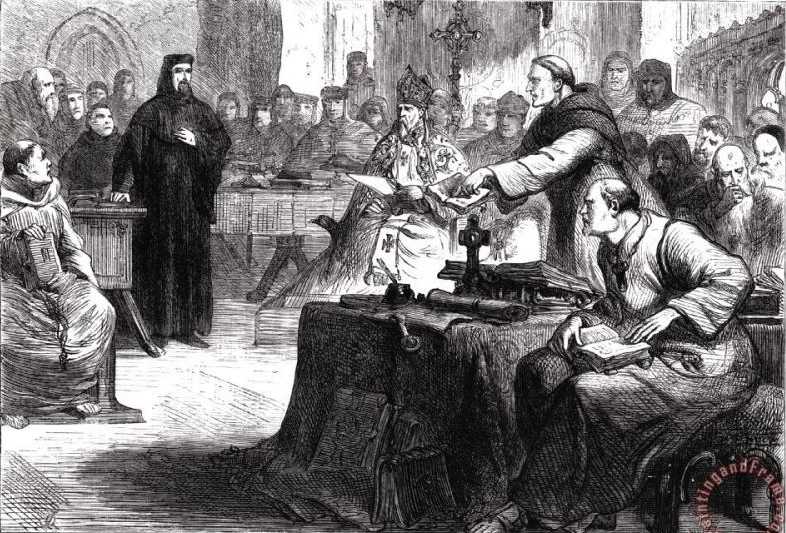
Growing freedom of spirit
Now, along with the literary revival, partly caused by, partly causing it, there had been also a wonderful stirring and uprising in the mind of Europe. The yoke of church authority still pressed heavily on the souls of men; yet some had been found to shake it off, and many more murmured in secret. The tendency was one which shewed itself in various and sometimes apparently opposite directions. The revolt of the Albigenses, the spread of the Cathari and other so-called heretics, the excitement created by the writings of Wickliffe and Huss, witnessed to the fearlessness wherewith it could assail the dominant theology. It was present, however skilfully disguised, among those scholastic doctors who busied themselves with proving by natural reason the dogmas of the Church: for the power which can forge fetters can also break them. It took a form more dangerous because of a more direct application to facts, in the attacks, so often repeated from Arnold of Brescia downwards, upon the wealth and corruptions of the clergy, and above all of the papal court.

Influence of thought upon the arrangements of society
For the agitation was not merely speculative. There was beginning to be a direct and rational interest in life, a power of applying thought to practical ends, which had not been seen before. Man’s life among his fellows was no longer a mere wild beast struggle; man’s soul no more, as it had been, the victim of ungoverned passion, whether it was awed by supernatural terrors or captivated by examples of surpassing holiness. Manners were still rude, and governments unsettled; but society was learning to organize itself upon fixed principles; to recognize, however faintly, the value of order, industry, equality; to adapt means to ends, and conceive of the common good as the proper end of its own existence. In a word, Politics had begun to exist, and with them there had appeared the first of a class of persons whom friends and enemies may both, though with different meanings, call ideal politicians; men who, however various have been the doctrines they have held, however impracticable many of the plans they have advanced, have been nevertheless alike in their devotion to the highest interests of humanity, and have frequently been derided as theorists in their own age to be honoured as the prophets and teachers of the next.
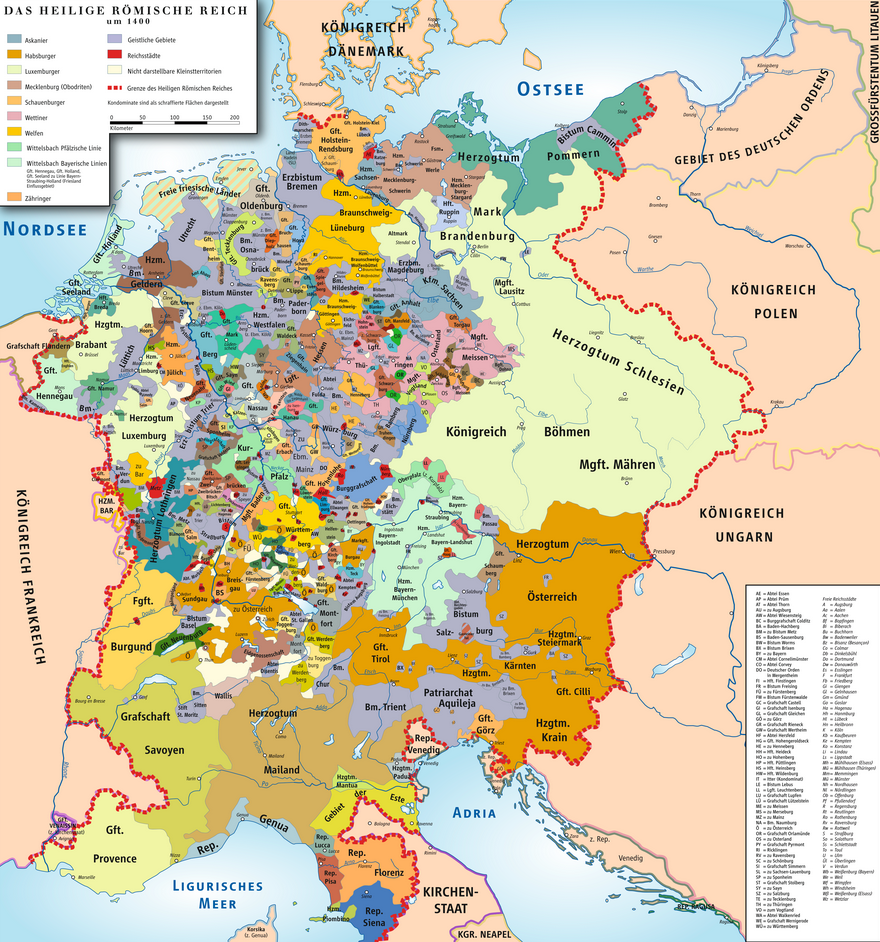
Separation of the peoples of Europe into hostile kingdoms: consequent need of an international power
Now it was towards the Roman Empire that the hopes and sympathies of these political speculators as well as of the jurists and poets of the fourteenth and fifteenth centuries were constantly directed. The cause may be gathered from the circumstances of the time. The most remarkable event in the history of the last three hundred years had been the formation of nationalities, each distinguished by a peculiar language and character, and by steadily increasing differences of habits and institutions. And as upon this national basis there had been in most cases established strong monarchies, Europe was broken up into disconnected bodies, and the cherished scheme of a united Christian state appeared less likely than ever to be realized. Nor was this all. Sometimes through race-hatred, more often by the jealousy and ambition of their sovereigns, these countries were constantly involved in war with one another, violating on a larger scale and with more destructive results than in time past the peace of the religious community; while each of them was at the same time torn within by frequent insurrections, and desolated by long and bloody civil wars. The new nationalities were too fully formed to allow the hope that by their extinction a remedy might be applied to these evils. They had grown up in spite of the Empire and the Church, and were not likely to yield in their strength what they had won in their weakness. But it still appeared possible to soften, if not to overcome, their antagonism. What might not be looked for from the erection of a presiding power common to all Europe, a power which, while it should oversee the internal concerns of each country, not dethroning the king, but treating him as an hereditary viceroy, should be more especially charged to prevent strife between kingdoms, and to maintain the public order of Europe by being not only the fountain of international law, but also the judge in its causes and the enforcer of its sentences?
The Popes as international Judges
To such a position had the Popes aspired. They were indeed excellently fitted for it by the respect which the sacredness of their office commanded; by their control of the tremendous weapons of excommunication and interdict; above all, by their exemption from those narrowing influences of place, or blood, or personal interest, which it would be their chiefest duty to resist in others. And there had been pontiffs whose fearlessness and justice were worthy of their exalted office, and whose interference was gratefully remembered by those who found no other helpers. Nevertheless, judging the Papacy by its conduct as a whole, it had been tried and found wanting. Even when its throne stood firmest and its purposes were most pure, one motive had always biassed its decisions—a partiality to the most submissive. During the greater part of the fourteenth century it was at Avignon the willing tool of France: in the pursuit of a temporal principality it had mingled in and been contaminated by the unhallowed politics of Italy; its supreme council, the college of cardinals, was distracted by the intrigues of two bitterly hostile factions. And while the power of the Popes had declined steadily, though silently, since the days of Boniface the Eighth, the insolence of the great prelates and the vices of the inferior clergy had provoked throughout Western Christendom a reaction against the pretensions of all sacerdotal authority. As there is no theory at first sight more attractive than that which entrusts all government to a supreme spiritual power, which, knowing what is best for man, shall lead him to his true good by appealing to the highest principles of his nature, so there is no disappointment more bitter than that of those who find that the holiest office may be polluted by the lusts and passions of its holder; that craft and hypocrisy lead while fanaticism follows; that here too, as in so much else, the corruption of the best is worst. Some such disappointment there was in Europe now, and with it a certain disposition to look with favour on the secular power: a wish to escape from the unhealthy atmosphere of clerical despotism to the rule of positive law, harsher, it might be, yet surely less corrupting. Espousing the cause of the Roman Empire as the chief opponent of priestly claims, this tendency found it, with shrunken territory and diminished resources, fitter in some respects for the office of an international judge and mediator than it had been as a great national power. For though far less widely active, it was losing that local character which was fast gathering round the Papacy. With feudal rights no longer enforcible, and removed, except in his patrimonial lands, from direct contact with the subject, the Emperor was not, as heretofore, conspicuously a German and a feudal king, and occupied an ideal position far less marred by the incongruous accidents of birth and training, of national and dynastic interests.
Duties attributed to the Empire by the developed theory
To that position three cardinal duties were attached. He who held it must typify spiritual unity, must preserve peace, must be a fountain of that by which alone among imperfect men peace is preserved and restored, law and justice. The first of these three objects was sought not only on religious grounds, but also from that longing for a wider brotherhood of humanity towards which, ever since the barrier between Jew and Gentile, Greek and barbarian, was broken down, the aspirations of the higher minds of the world have been constantly directed. Placed in the midst of Europe, the Emperor was to bind its tribes into one body, reminding them of their common faith, their common blood, their common interest in each other’s welfare. And he was therefore above all things, professing indeed to be upon earth the representative of the Prince of Peace, bound to listen to complaints, and to redress the injuries inflicted by sovereigns or people upon each other; to punish offenders against the public order of Christendom; to maintain through the world, looking down as from a serene height upon the schemes and quarrels of meaner potentates, that supreme good without which neither arts nor letters, nor the gentler virtues of life, can rise and flourish.

Divine right of the Emperor
The mediæval Empire was in its essence what the modern despotisms that mimic it profess themselves: the Empire was peace: the oldest and noblest title of its head was ‘Imperator pacificus.’ And that he might be the peacemaker, he must be the expounder of justice and the author of its concrete embodiment, positive law; chief legislator and supreme judge of appeal, like his predecessor the compiler of the Corpus Iuris, the one and only source of all legitimate authority. In this sense, as governor and administrator, not as owner, is he, in the words of the jurists, Lord of the world; not that its soil belongs to him in the same sense in which the soil of France or England belongs to their respective kings: he is the steward of Him who has received the heathen for his possession and the uttermost parts of the earth for his inheritance. It is, therefore, by him alone that the idea of pure right, acquired not by force but by legitimate devolution from those whom God himself had set up, is visibly expressed upon earth. To find an external and positive basis for that idea is a problem which it has at all times been more easy to evade than to solve, and one peculiarly distressing to those who could neither explain the phenomena of society by reducing it to its original principles, nor inquire historically how its existing arrangements had grown up. Hence the attempt to represent human government as an emanation from divine: a view from which all the similar but far less logically consistent doctrines of divine right which have prevailed in later times are borrowed. As has been said already, there is not a trace of the notion that the Emperor reigns by an hereditary right of his own or by the will of the people, for such a theory would have seemed to the men of the middle ages an absurd and wicked perversion of the true order. Nor do his powers come to him from those who choose him, but from God, who uses the electoral princes as mere instruments of nomination. Having such an origin, his rights exist irrespective of their actual exercise, and no voluntary abandonment, not even an express grant, can impair them. Boniface the Eighth reminds the king of France, and imperialist lawyers till the seventeenth century repeated the claim, that he, like other princes, is of right and must ever remain subject to the Roman Emperor. And the sovereigns of Europe long continued to address the Emperor in language, and yield to him a precedence, which admitted the inferiority of their own position.
There was in this theory nothing that was absurd, though much that was impracticable. The ideas on which it rested are still unapproached in grandeur and simplicity, still as far in advance of the average thought of Europe, and as unlikely to find men or nations fit to apply them, as when they were promulgated five hundred years ago. The practical evil which the establishment of such a universal monarchy was intended to meet, that of wars and hardly less ruinous preparations for war between the states of Europe, remains what it was then. The remedy which mediæval theory proposed has been in some measure applied by the construction and reception of international law; the greater difficulty of erecting a tribunal to arbitrate and decide, with the power of enforcing its decisions, is as far from a solution as ever.
The Roman Empire: why an international power
It is easy to see how it was to the Roman Emperor, and to him only, that the duties and privileges above mentioned could be attributed. Being Roman, he was of no nation, and therefore fittest to judge between contending states, and appease the animosities of race. His was the imperial tongue of Rome, not only the vehicle of religion and law, but also, since no other was understood everywhere in Europe, the necessary medium of diplomatic intercourse. As there was no Church but the Holy Roman Church, and he its temporal head, it was by him that the communion of the saints in its outward form, its secular side, was represented, and to his keeping that the sanctity of peace must be entrusted. As direct heir of those who from Julius to Justinian had shaped the existing law of Europe, he was, so to speak, legality personified; the only sovereign on earth who, being possessed of power by an unimpeachable title, could by his grant confer upon others rights equally valid. And as he claimed to perpetuate the greatest political system the world had known, a system which still moves the wonder of those who see before their eyes empires as much wider than the Roman as they are less symmetrical, and whose vast and complex machinery far surpassed anything the fourteenth century possessed or could hope to establish, it was not strange that he and his government (assuming them to be what they were entitled to be) should be taken as the ideal of a perfect monarch and a perfect state.
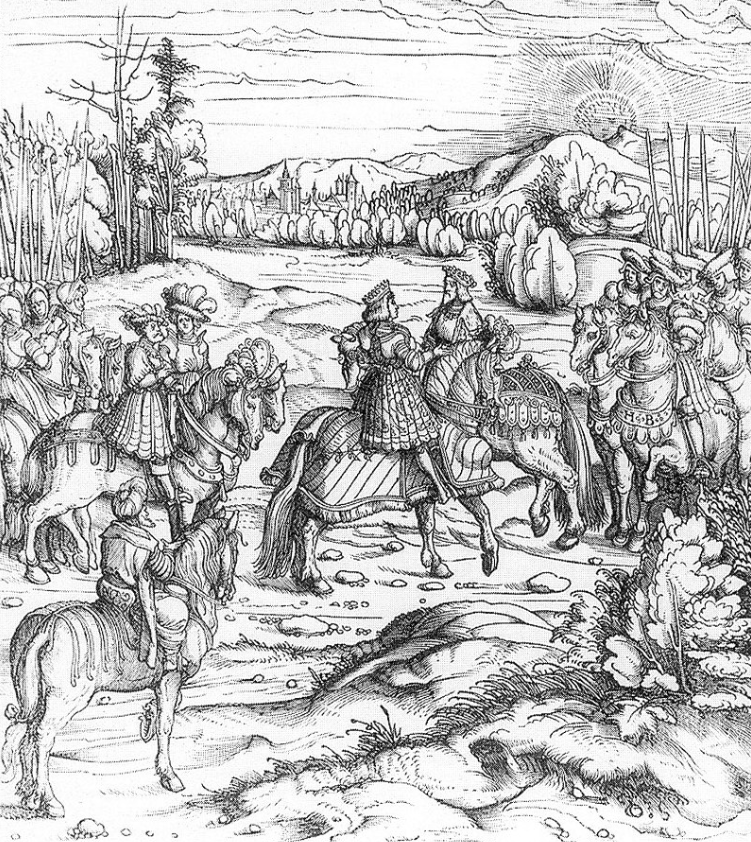
Right of creating Kings
Of the many applications and illustrations of these doctrines which mediæval documents furnish, it will suffice to adduce two or three. No imperial privilege was prized more highly than the power of creating kings, for there was none which raised the Emperor so much above them. In this, as in other international concerns, the Pope soon began to claim a jurisdiction, at first concurrent, then separate and independent. But the older and more reasonable view assigned it, as flowing from the possession of supreme secular authority, to the Emperor; and it was from him that the rulers of Burgundy, Bohemia, Hungary, perhaps Poland and Denmark, received the regal title. The prerogative was his in the same manner in which that of conferring titles is still held to belong to the sovereign in every modern kingdom. And so when Charles the Bold, last duke of French Burgundy, proposed to consolidate his wide dominions into a kingdom, it was from Frederick III that he sought permission to do so. The Emperor, however, was greedy and suspicious, the Duke uncompliant; and when Frederick found that terms could not be arranged between them, he stole away suddenly, and left Charles to carry back, with ill-concealed mortification, the crown and sceptre which he had brought ready-made to the place of interview.
Chivalry
In the same manner, as representing what was common to and valid throughout all Europe, nobility, and more particularly knighthood, centred in the Empire. The great Orders of Chivalry were international institutions, whose members, having consecrated themselves a military priesthood, had no longer any country of their own, and could therefore be subject to no one save the Emperor and the Pope. For knighthood was constructed on the analogy of priesthood, and knights were conceived of as being to the world in its secular aspect exactly what priests, and more especially the monastic orders, were to it in its religious aspect: to the one body was given the sword of the flesh, to the other the sword of the spirit; each was universal, each had its autocratic head. Singularly, too, were these notions brought into harmony with the feudal polity. Cæsar was lord paramount of the world: its countries great fiefs whose kings were his tenants in chief, the suitors of his court, owing to him homage, fealty, and military service against the infidel.
Persons eligible as Emperors
One illustration more of the way in which the empire was held to be something of and for all mankind, cannot be omitted. Although from the practical union of the imperial with the German throne none but Germans were chosen to fill it, it remained in point of law absolutely free from all restrictions of country or birth. In an age of the most intense aristocratic exclusiveness, the highest office in the world was the only secular one open to all Christians. The old writers, after debating at length the qualifications that are or may be desirable in an Emperor, and relating how in pagan times Gauls and Spaniards, Moors and Pannonians, were thought worthy of the purple, decide that two things, and no more, are required of the candidate for Empire: he must be free-born, and he must be orthodox.
The Empire and the new learning
It is not without a certain surprise that we see those who were engaged in the study of ancient letters, or felt indirectly their stimulus, embrace so fervently the cause of the Roman Empire. Still more difficult is it to estimate the respective influence exerted by each of the three revivals which it has been attempted to distinguish. The spirit of the ancient world by which the men who led these movements fancied themselves animated, was in truth a pagan, or at least a strongly secular spirit, in many respects inconsistent with the associations which had now gathered round the imperial office. And this hostility did not fail to shew itself when at the beginning of the sixteenth century, in the fulness of the Renaissance, a direct and for the time irresistible sway was exercised by the art and literature of Greece, when the mythology of Euripides and Ovid supplanted that which had fired the imagination of Dante and peopled the visions of St. Francis; when men forsook the image of the saint in the cathedral for the statue of the nymph in the garden; when the uncouth jargon of scholastic theology was equally distasteful to the scholars who formed their style upon Cicero and the philosophers who drew their inspiration from Plato. That meanwhile the admirers of antiquity did ally themselves with the defenders of the Empire, was due partly indeed to the false notions that were entertained regarding the early Cæsars, yet still more to the common hostility of both sects to the Papacy. It was as successor of old Rome, and by virtue of her traditions, that the Holy See had established so wide a dominion; yet no sooner did Arnold of Brescia and his republicans arise, claiming liberty in the name of the ancient constitution of the republic, than they found in the Popes their bitterest foes, and turned for help to the secular monarch against the clergy. With similar aversion did the Romish court view the revived study of the ancient jurisprudence, so soon as it became, in the hands of the school of Bologna and afterwards of the jurists of France, a power able to assert its independence and resist ecclesiastical pretensions. In the ninth century, Pope Nicholas the First had himself judged in the famous case of Teutberga, wife of Lothar, according to the civil law: in the thirteenth, his successors forbade its study, and the canonists strove to expel it from Europe. And as the current of educated opinion among the laity was beginning, however imperceptibly at first, to set against sacerdotal tyranny, it followed that the Empire would find sympathy in any effort it could make to regain its lost position.
The doctrine of the Empire’s rights and functions never carried out in fact
Thus the Emperors became, or might have become had they seen the greatness of the opportunity and been strong enough to improve it, the exponents and guides of the political movement, the pioneers, in part at least, of the Reformation. But the revival came too late to arrest, if not to adorn, the decline of their office. The growth of a national sentiment in the several countries of Europe, which had already gone too far to be arrested, and was urged on by forces far stronger than the theories of Catholic unity which opposed it, imprinted on the resistance to papal usurpation, and even on the instincts of political freedom, that form of narrowly local patriotism which they still retain. It can hardly be said that upon any occasion, except the gathering of the council of Constance by Sigismund, did the Emperor appear filling a truly international place. For the most part he exerted in the politics of Europe no influence greater than that of other princes. In actual resources he stood below the kings of France and England, far below his vassals the Visconti of Milan. Yet this helplessness, such was men’s faith or their timidity, and such their unwillingness to make prejudice bend to facts, did not prevent his dignity from being extolled in the most sonorous language by writers whose imaginations were enthralled by the halo of traditional glory which surrounded it.
Attitude of the men of letters
We are thus brought back to ask, What was the connection between imperialism and the literary revival?
To moderns who think of the Roman Empire as the heathen persecuting power, it is strange to find it depicted as the model of a Christian commonwealth. It is stranger still that the study of antiquity should have made men advocates of arbitrary power. Democratic Athens, oligarchic Rome, suggest to us Pericles and Brutus: the moderns who have striven to catch their spirit have been men like Algernon Sidney, and Vergniaud, and Shelley. The explanation is the same in both cases. The ancient world was known to the earlier middle ages by tradition, freshest for what was latest, and by the authors of the Empire. Both presented to them the picture of a mighty despotism and a civilization brilliant far beyond their own. Writings of the fourth and fifth centuries, unfamiliar to us, were to them authorities as high as Tacitus or Livy; yet Virgil and Horace too had sung the praises of the first and wisest of the Emperors. To the enthusiasts of poetry and law, Rome meant universal monarchy; to those of religion, her name called up the undimmed radiance of the Church under Sylvester and Constantine.
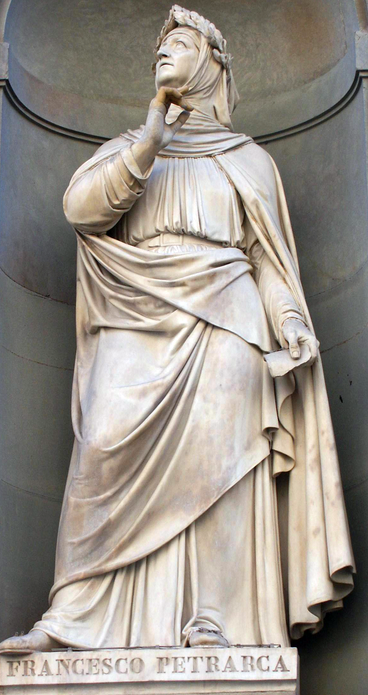
Petrarch
Petrarch, the apostle of the dawning Renaissance, is excited by the least attempt to revive even the shadow of imperial greatness: as he had hailed Rienzi, he welcomes Charles IV into Italy, and execrates his departure. The following passage is taken from his letter to the Roman people asking them to receive back Rienzi:—’When was there ever such peace, such tranquillity, such justice, such honour paid to virtue, such rewards distributed to the good and punishments to the bad, when was ever the state so wisely guided, as in the time when the world had obtained one head, and that head Rome; the very time wherein God deigned to be born of a virgin and dwell upon earth. To every single body there has been given a head; the whole world therefore also, which is called by the poet a great body, ought to be content with one temporal head. For every two-headed animal is monstrous; how much more horrible and hideous a portent must be a creature with a thousand different heads, biting and fighting against one another! If, however, it is necessary that there be more heads than one, it is nevertheless evident that there ought to be one to restrain all and preside over all, that so the peace of the whole body may abide unshaken. Assuredly both in heaven and in earth the sovereignty of one has always been best.’
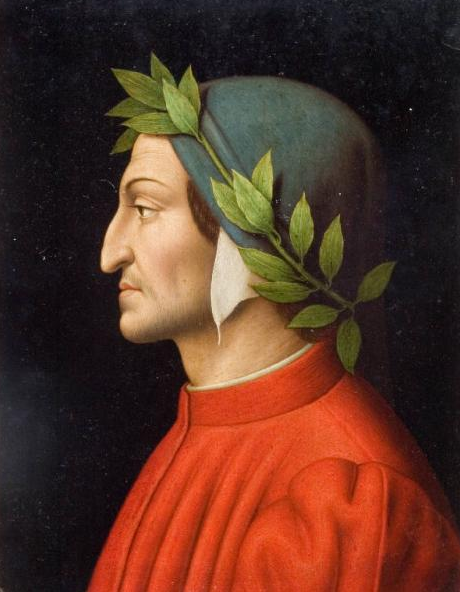
Dante
His passion for the heroism of Roman conquest and the ordered peace to which it brought the world, is the centre of Dante’s political hopes: he is no more an exiled Ghibeline, but a patriot whose fervid imagination sees a nation arise regenerate at the touch of its rightful lord. Italy, the spoil of so many Teutonic conquerors, is the garden of the Empire which Henry is to redeem: Rome the mourning widow, whom Albert is denounced for neglecting. Passing through purgatory, the poet sees Rudolf of Hapsburg seated gloomily apart, mourning his sin in that he left unhealed the wounds of Italy. In the deepest pit of hell’s ninth circle lies Lucifer, huge, three-headed; in each mouth a sinner whom he crunches between his teeth, in one mouth Iscariot the traitor to Christ, in the others the two traitors to the first Emperor of Rome, Brutus and Cassius. To multiply illustrations from other parts of the poem would be an endless task; for the idea is ever present in Dante’s mind, and displays itself in a hundred unexpected forms. Virgil himself is selected to be the guide of the pilgrim through hell and purgatory, not so much as being the great poet of antiquity, as because he ‘was born under Julius and lived beneath the good Augustus;’ because he was divinely charged to sing of the Empire’s earliest and brightest glories. Strange, that the shame of one age should be the glory of another. For Virgil’s melancholy panegyrics upon the destroyer of the republic are no more like Dante’s appeals to the coming saviour of Italy than is Cæsar Octavianus to Henry count of Luxemburg.
Attitude of the Jurists
The visionary zeal of the man of letters was seconded by the more sober devotion of the lawyer. Conqueror, theologian, and jurist, Justinian is a hero greater than either Julius or Constantine, for his enduring work bears him witness. Absolutism was the civilian’s creed: the phrases ‘legibus solutus,’ ‘lex regia,’ whatever else tended in the same direction, were taken to express the prerogative of him whose official style of Augustus, as well as the vernacular name of ‘Kaiser,’ designated the legitimate successor of the compiler of the Corpus Juris. Since it was upon that legitimacy that his claim to be the fountain of law rested, no pains were spared to seek out and observe every custom and precedent by which old Rome seemed to be connected with her representative.
Imitations of old Rome
Of the many instances that might be collected, it would be tedious to enumerate more than a few. The offices of the imperial household, instituted by Constantine the Great, were attached to the noblest families of Germany. The Emperor and Empress, before their coronation at Rome, were lodged in the chambers called those of Augustus and Livia; a bare sword was borne before them by the prætorian prefect; their processions were adorned by the standards, eagles, wolves and dragons, which had figured in the train of Hadrian or Theodosius. The constant title of the Emperor himself, according to the style introduced by Probus, was ‘semper Augustus,’ or ‘perpetuus Augustus,’ which erring etymology translated ‘at all times increaser of the Empire.’ Edicts issued by a Franconian or Swabian sovereign were inserted as Novels in the Corpus Juris, in the latest editions of which custom still allows them a place. The pontificatus maximus of his pagan predecessors was supposed to be preserved by the admission of each Emperor as a canon of St. Peter’s at Rome and St. Mary’s at Aachen. Sometimes we even find him talking of his consulship. Annalists invariably number the place of each sovereign from Augustus downwards. The notion of an uninterrupted succession, which moves the stranger’s wondering smile as he sees ranged round the magnificent Golden Hall of Augsburg the portraits of the Cæsars, laurelled, helmeted, and periwigged, from Julius the conqueror of Gaul to Joseph the partitioner of Poland, was to those generations not an article of faith only because its denial was inconceivable.
Reverence for ancient forms and phrases in the Middle Ages
And all this historical antiquarianism, as one might call it, which gathers round the Empire, is but one instance, though the most striking, of that eager wish to cling to the old forms, use the old phrases, and preserve the old institutions to which the annals of mediæval Europe bear witness. It appears even in trivial expressions, as when a monkish chronicler says of evil bishops deposed, Tribu moti sunt, or talks of the ‘senate and people of the Franks,’ when he means a council of chiefs surrounded by a crowd of half-naked warriors. So throughout Europe charters and edicts were drawn up on Roman precedents; the trade-guilds, though often traceable to a different source, represented the old collegia; villenage was the offspring of the system of coloni under the later Empire. Even in remote Britain, the Teutonic invaders used Roman ensigns, and stamped their coins with Roman devices; called themselves ‘Basileis’ and ‘Augusti.’ Especially did the cities perpetuate Rome through her most lasting boon to the conquered, municipal self-government; those of later origin emulating in their adherence to antique style others who, like Nismes and Cologne, Zürich and Augsburg, could trace back their institutions to the coloniæ and municipia of the first centuries. On the walls and gates of hoary Nürnberg the traveller still sees emblazoned the imperial eagle, with the words ‘Senatus populusque Norimbergensis,’ and is borne in thought from the quiet provincial town of to-day to the stirring republic of the middle ages: thence to the Forum and the Capitol of her greater prototype.
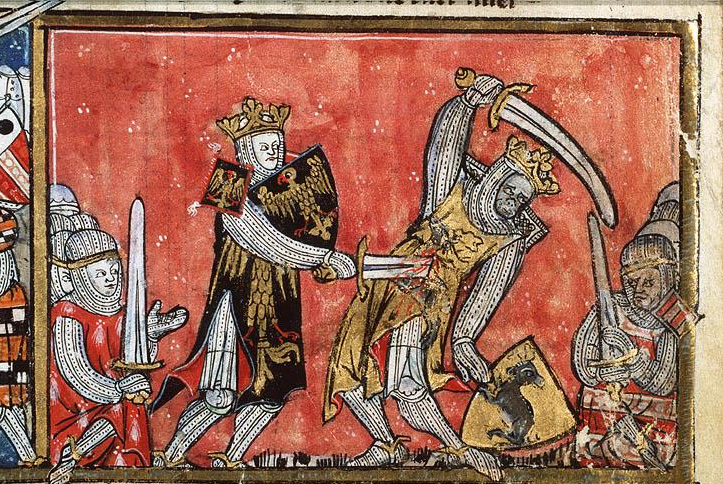
Absence of the idea of change or progress
For, in truth, through all that period which we call the Dark and Middle Ages, men’s minds were possessed by the belief that all things continued as they were from the beginning, that no chasm never to be recrossed lay between them and that ancient world to which they had not ceased to look back. We who are centuries removed can see that there had passed a great and wonderful change upon thought, and art, and literature, and politics, and society itself: a change whose best illustration is to be found in the process whereby there arose out of the primitive basilica the Romanesque cathedral, and from it in turn the endless varieties of Gothic. But so gradual was the change that each generation felt it passing over them no more than a man feels that perpetual transformation by which his body is renewed from year to year; while the few who had learning enough to study antiquity through its contemporary records, were prevented by the utter want of criticism and of that which we call historical feeling, from seeing how prodigious was the contrast between themselves and those whom they admired. There is nothing more modern than the critical spirit which dwells upon the difference between the minds of men in one age and in another; which endeavours to make each age its own interpreter, and judge what it did or produced by a relative standard. Such a spirit was, before the last century or two, wholly foreign to art as well as to metaphysics. The converse and the parallel of the fashion of calling mediæval offices by Roman names, and supposing them therefore the same, is to be found in those old German pictures of the siege of Carthage or the battle between Porus and Alexander, where in the foreground two armies of knights, mailed and mounted, are charging each other like Crusaders, lance in rest, while behind, through the smoke of cannon, loom out the Gothic spires and towers of the beleaguered city. And thus, when we remember that the notion of progress and development, and of change as the necessary condition thereof, was unwelcome or unknown in mediæval times, we may better understand, though we do not cease to wonder, how men, never doubting that the political system of antiquity had descended to them, modified indeed, yet in substance the same, should have believed that the Frank, the Saxon, and the Swabian ruled all Europe by a right which seems to us not less fantastic than that fabled charter whereby Alexander the Great bequeathed his empire to the Slavic race for the love of Roxolana.
It is a part of that perpetual contradiction of which the history of the Middle Ages is full, that this belief had hardly any influence on practical politics. The more abjectly helpless the Emperor becomes, so much the more sonorous is the language in which the dignity of his crown is described. His power, we are told, is eternal, the provinces having resumed their allegiance after the barbarian irruptions; it is incapable of diminution or injury: exemptions and grants by him, so far as they tend to limit his own prerogative, are invalid: all Christendom is still of right subject to him, though it may contumaciously refuse obedience. The sovereigns of Europe are solemnly warned that they are resisting the power ordained of God. No laws can bind the Emperor, though he may choose to live according to them: no court can judge him, though he may condescend to be sued in his own: none may presume to arraign the conduct or question the motives of him who is answerable only to God. So writes Æneas Sylvius, while Frederick the Third, chased from his capital by the Hungarians, is wandering from convent to convent, an imperial beggar; while the princes, whom his subserviency to the Pope has driven into rebellion, are offering the imperial crown to Podiebrad the Bohemian king.
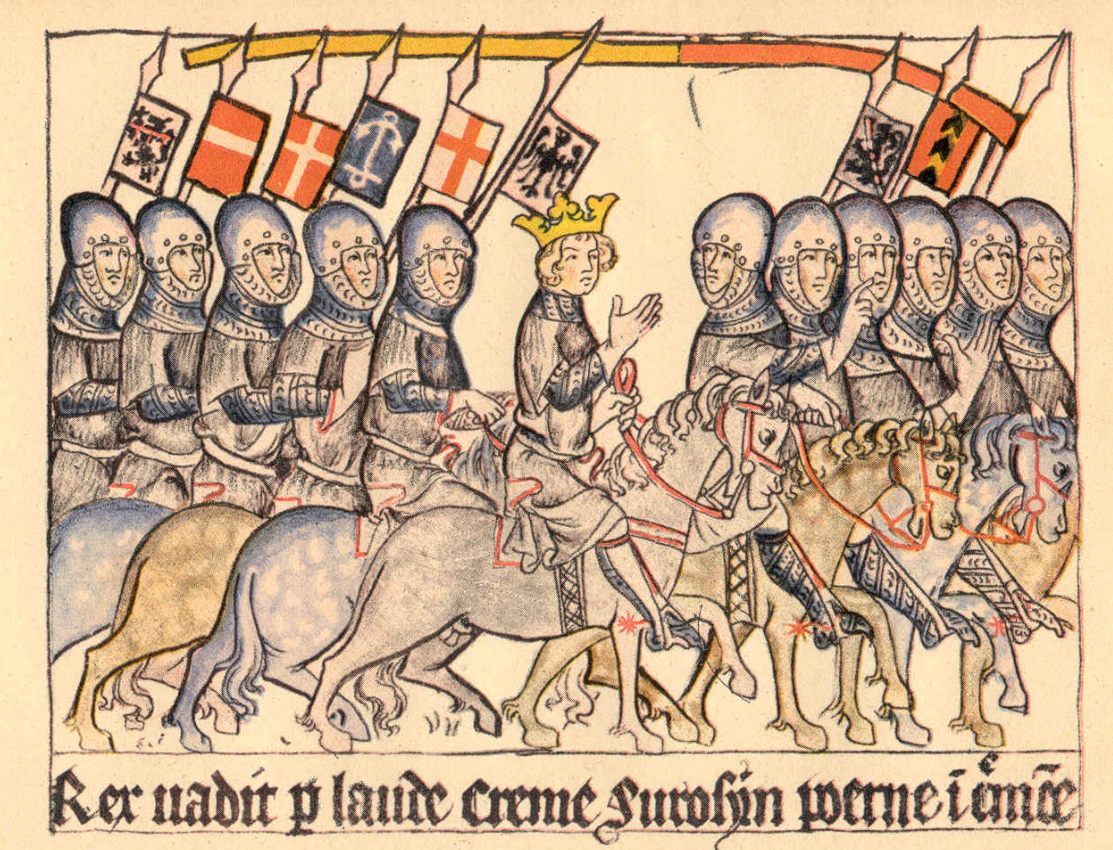
Henry VII, A.D. 1308-1313
But the career of Henry the Seventh in Italy is the most remarkable illustration of the Emperor’s position: and imperialist doctrines are set forth most strikingly in the treatise which the greatest spirit of the age wrote to herald the advent of that hero, the De Monarchia of Dante. Rudolf, Adolf of Nassau, Albert of Hapsburg, none of them crossed the Alps or attempted to aid the Italian Ghibelines who battled away in the name of their throne. Concerned only to restore order and aggrandize his house, and thinking apparently that nothing more was to be made of the imperial crown, Rudolf was content never to receive it, and purchased the Pope’s goodwill by surrendering his jurisdiction in the capital, and his claims over the bequest of the Countess Matilda. Henry the Luxemburger ventured on a bolder course; urged perhaps only by his lofty and chivalrous spirit, perhaps in despair at effecting anything with his slender resources against the princes of Germany. Crossing from his Burgundian dominions with a scanty following of knights, and descending from the Cenis upon Turin, he found his prerogative higher in men’s belief after sixty years of neglect than it had stood under the last Hohenstaufen. The cities of Lombardy opened their gates; Milan decreed a vast subsidy; Guelf and Ghibeline exiles alike were restored, and imperial vicars appointed everywhere: supported by the Avignonese pontiff, who dreaded the restless ambition of his French neighbour, king Philip IV, Henry had the interdict of the Church as well as the ban of the Empire at his command.
Death of Henry VII
But the illusion of success vanished as soon as men, recovering from their first impression, began to be again governed by their ordinary passions and interests, and not by an imaginative reverence for the glories of the past. Tumults and revolts broke out in Lombardy; at Rome the king of Naples held St. Peter’s, and the coronation must take place in St. John Lateran, on the southern bank of the Tiber. The hostility of the Guelfic league, headed by the Florentines, Guelfs even against the Pope, obliged Henry to depart from his impartial and republican policy, and to purchase the aid of the Ghibeline chiefs by granting them the government of cities. With few troops, and encompassed by enemies, the heroic Emperor sustained an unequal struggle for a year longer, till, in A.D. 1313, he sank beneath the fevers of the deadly Tuscan summer. His German followers believed, nor has history wholly rejected the tale, that poison was given him by a Dominican monk, in sacramental wine.
Later Emperors in Italy
Others after him descended from the Alps, but they came, like Lewis the Fourth, Rupert, Sigismund, at the behest of a faction, which found them useful tools for a time, then flung them away in scorn; or like Charles the Fourth and Frederick the Third, as the humble minions of a French or Italian priest. With Henry the Seventh ends the history of the Empire in Italy, and Dante’s book is an epitaph instead of a prophecy. A sketch of its argument will convey a notion of the feelings with which the noblest Ghibelines fought, as well as of the spirit in which the Middle Age was accustomed to handle such subjects.
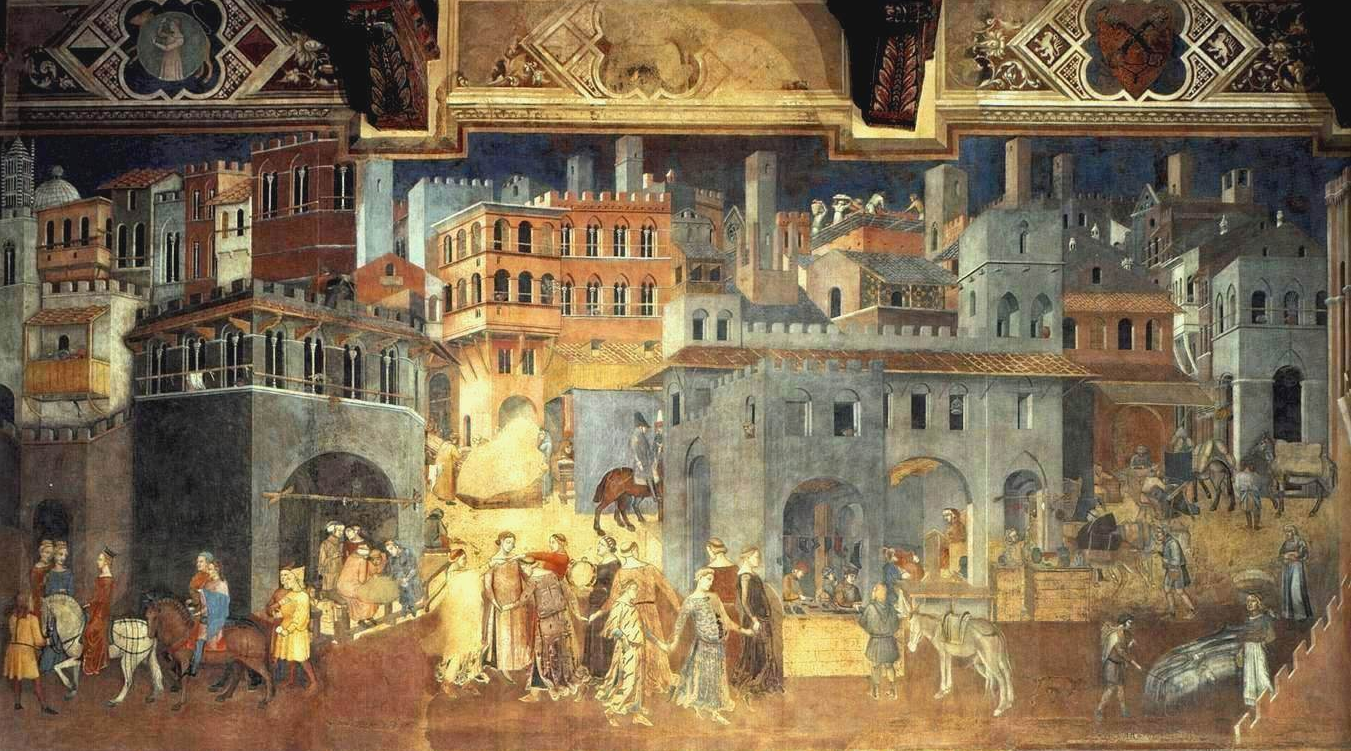
Dante’s feelings and theories
Weary of the endless strife of princes and cities, of the factions within every city against each other, seeing municipal freedom, the only mitigation of turbulence, vanish with the rise of domestic tyrants, Dante raises a passionate cry for some power to still the tempest, not to quench liberty or supersede local self-government, but to correct and moderate them, to restore unity and peace to hapless Italy. His reasoning is throughout closely syllogistic: he is alternately the jurist, the theologian, the scholastic metaphysician: the poet of the Divina Commedia is betrayed only by the compressed energy of diction, by his clear vision of the unseen, rarely by a glowing metaphor.
The ‘De Monarchia’
Monarchy is first proved to be the true and rightful form of government. Men’s objects are best attained during universal peace: this is possible only under a monarch. And as he is the image of the Divine unity, so man is through him made one, and brought most near to God. There must, in every system of forces, be a ‘primum mobile;’ to be perfect, every organization must have a centre, into which all is gathered, by which all is controlled. Justice is best secured by a supreme arbiter of disputes, himself unsolicited by ambition, since his dominion is already bounded only by ocean. Man is best and happiest when he is most free; to be free is to exist for one’s own sake. To this grandest end does the monarch and he alone guide us; other forms of government are perverted, and exist for the benefit of some class; he seeks the good of all alike, being to that very end appointed.
Abstract arguments are then confirmed from history. Since the world began there has been but one period of perfect peace, and but one of perfect monarchy, that, namely, which existed at our Lord’s birth, under the sceptre of Augustus; since then the heathen have raged, and the kings of the earth have stood up; they have set themselves against their Lord, and his anointed the Roman prince. The universal dominion, the need for which has been thus established, is then proved to belong to the Romans. Justice is the will of God, a will to exalt Rome shewn through her whole history. Her virtues deserved honour: Virgil is quoted to prove those of Æneas, who by descent and marriage was the heir of three continents: of Asia through Assaracus and Creusa; of Africa by Electra (mother of Dardanus and daughter of Atlas) and Dido; of Europe by Dardanus and Lavinia. God’s favour was approved in the fall of the shields to Numa, in the miraculous deliverance of the capital from the Gauls, in the hailstorm after Cannæ. Justice is also the advantage of the state: that advantage was the constant object of the virtuous Cincinnatus, and the other heroes of the republic. They conquered the world for its own good, and therefore justly, as Cicero attests; so that their sway was not so much ‘imperium’ as ‘patrocinium orbis terrarum.’ Nature herself, the fountain of all right, had, by their geographical position and by the gift of a genius so vigorous, marked them out for universal dominion:—
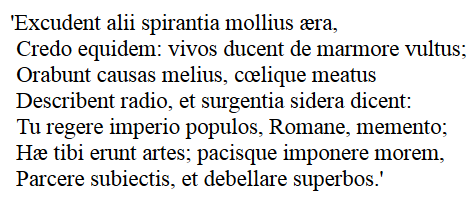
Finally, the right of war asserted, Christ’s birth, and death under Pilate, ratified their government. For Christian doctrine requires that the procurator should have been a lawful judge, which he was not unless Tiberius was a lawful Emperor.
The relations of the imperial and papal power are then examined, and the passages of Scripture (tradition being rejected), to which the advocates of the Papacy appeal, are elaborately explained away. The argument from the sun and moon does not hold, since both lights existed before man’s creation, and at a time when, as still sinless, he needed no controlling powers. Else accidentia would have preceded propria in creation. The moon, too, does not receive her being nor all her light from the sun, but so much only as makes her more effective. So there is no reason why the temporal should not be aided in a corresponding measure by the spiritual authority. This difficult text disposed of, others fall more easily; Levi and Judah, Samuel and Saul, the incense and gold offered by the Magi; the two swords, the power of binding and loosing given to Peter. Constantine’s donation was illegal: no single Emperor nor Pope can disturb the everlasting foundations of their respective thrones: the one had no right to bestow, nor the other to receive, such a gift. Leo the Third gave the Empire to Charles wrongfully: ‘usurpatio iuris non facit ius.’ It is alleged that all things of one kind are reducible to one individual, and so all men to the Pope. But Emperor and Pope differ in kind, and so far as they are men, are reducible only to God, on whom the Empire immediately depends; for it existed before Peter’s see, and was recognized by Paul when he appealed to Cæsar. The temporal power of the Papacy can have been given neither by natural law, nor divine ordinance, nor universal consent: nay, it is against its own Form and Essence, the life of Christ, who said, ‘My kingdom is not of this world.’
Man’s nature is twofold, corruptible and incorruptible: he has therefore two ends, active virtue on earth, and the enjoyment of the sight of God hereafter; the one to be attained by practice conformed to the precepts of philosophy, the other by the theological virtues. Hence two guides are needed, the pontiff and the Emperor, the latter of whom, in order that he may direct mankind in accordance with the teachings of philosophy to temporal blessedness, must preserve universal peace in the world. Thus are the two powers equally ordained of God, and the Emperor, though supreme in all that pertains to the secular world, is in some things dependent on the pontiff, since earthly happiness is subordinate to eternal. ‘Let Cæsar, therefore, shew towards Peter the reverence wherewith a firstborn son honours his father, that, being illumined by the light of his paternal favour, he may the more excellently shine forth upon the whole world, to the rule of which he has been appointed by Him alone who is of all things, both spiritual and temporal, the King and Governor.’ So ends the treatise.
The ‘De Monarchia:’ conclusion
Dante’s arguments are not stranger than his omissions. No suspicion is breathed against Constantine’s donation; no proof is adduced, for no doubt is felt, that the Empire of Henry the Seventh is the legitimate continuation of that which had been swayed by Augustus and Justinian. Yet Henry was a German, sprung from Rome’s barbarian foes, the elected of those who had neither part nor share in Italy and her capital.










Well damn…this summary chapter is a heck of a lot to chew on…there will be questions, but this will take some time to ponder.
Excellent find for reading material sir, thank you for bringing it to light.